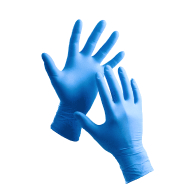Ansell ActivArmr Hycron 27-600
Ansell
visit storeProduct description
Description
Advanced durability and protection: ActivArmr® Hycron 27-600 industrial gloves feature a unique, highly durable nitrile formulation, granting users advanced protection against abrasive materials, as well as flexibility and grease and oil resistance
Increased comfort: These grease-resistant gloves are also made from cotton jersey fabric, cushioning the hand and absorbing perspiration
Reduced surface defect risks: Silicone-free by design, ActivArmr® Hycron 27-600 work gloves prevent contaminant transfer to metal before painting, resulting in a high-quality finish
Recommended for
Handling metal sheets & panels
Metalworking & assembly operations
Press injection molding
Seizing and finishing structural parts
Fixing, clipping parts and wire harnesses; connecting devices
Assembly & inspection of components
Product Details
Antistatic : Yes
Length : 246-272 Mm, 9.68-10.7 Inches
Available Sizes : 8, 9, 10, 11
Coating Color : Blue
Coating Material : Nitrile
Construction : Cut & Sewn
Cuff Style : Knitwrist
Finishing : ¾ Coated
Latex Free : Yes
Liner Color : Blue
Liner Material : Cotton Jersey
Silicone Free : Yes
Washing Temperature : 40 °C (104 °F)
The interior fabric that contacts your skin, affecting comfort, temperature regulation, moisture control, and allergen exposure during extended wear periods.
Crafted from cut pieces of material sewn together, offering design flexibility and a tailored fit. Ideal for customized protection and comfort.
Suited for various tasks, these gloves offer essential protection and flexibility. A practical choice providing comfort and durability for everyday use.
#NAME?
Provides complete hand coverage, shielding fingers from hazards. Offers maximum protection and warmth, ideal for demanding tasks and environments.
The design of the wrist area that secures the glove and prevents debris entry. Different styles offer varying levels of adjustability, protection, and comfort.
Indicates the extent of protective coating applied to the glove, affecting grip strength, liquid resistance, durability, and task-specific dexterity.
The visual appearance that enhances workplace safety through visibility, identification, and hazard awareness while allowing for team differentiation and brand recognition.
- Electrical Protection
- Cut Resistant
- Machine Washable
- Hand Protection
Request a free sample
Test first and buy later. Visit any product page to request your free sample.
Standards and labels
Test results
General Requirements GuideEN ISO 21420:2020 is a standard that outlines general requirements and guidelines for protective gloves, aiming to ensure their quality, performance, and suitability for various applications. When a product meets the requirements outlined in the General Requirements section of EN ISO 21420:2020, it signifies that the gloves comply with fundamental quality and performance criteria, including factors such as size, fit, ergonomics, and dexterity. The practical implications of this compliance are significant, as it assures users of the gloves' basic functionality and suitability for general hand protection purposes across a range of industries and applications. The test method involves evaluating various aspects of the gloves, including dimensions, construction, materials, and labeling, to ensure conformity with the specified requirements. Compliance with these general requirements enhances user confidence in the protective gloves' reliability and effectiveness, promoting workplace safety and facilitating compliance with regulatory standards.
EN 420:2003+A1:2009 is a European standard that sets out the general requirements for hand protection, including comfort, fit, and dexterity. Performance requirements include resistance to abrasion, cut, tear, puncture, and impact. Test results should show the gloves meet these requirements.
EN 388:2016 is a European standard for measuring the performance of protective gloves against mechanical risks (abrasion, cut, tear, and puncture). The standard includes test methods and performance requirements for gloves to be considered compliant. Test results are reported using a series of four numbers, each representing the performance level achieved in one of the tests.
Test results
Tear Resistance Level 2EN 388:2016 is a European standard that sets criteria for testing the mechanical risks for protective gloves, including abrasion, cut, tear, and puncture resistance. The Tear Resistance Level 2 designation indicates that the gloves have a moderate level of resistance to tearing. The test for tear resistance involves subjecting a sample of the glove material to a force until it tears, and the force required to initiate and propagate the tear is measured. Gloves that achieve Level 2 tear resistance can withstand between 25 to 50 Newtons of force. This level of tear resistance is suitable for tasks where gloves might face moderate stresses that could cause tearing, such as general handling and light industrial work where sharp or jagged materials are handled less frequently. These gloves provide reliable protection and durability in scenarios where some degree of mechanical risk is present but not excessively severe.
Puncture Resistance Level 1The European standard EN 388:2016 addresses the puncture resistance of protective gloves, with puncture resistance classified from Levels 1 to 4. Specifically, a Level 1 result indicates minimal puncture resistance. This level of resistance is determined by a test involving a standardized stylus with a specified diameter and force. During the test, the stylus is pressed against the material with a force up to 20 Newtons to assess how well the glove can withstand penetration. A Level 1 rating signifies that the glove provides basic protection against small punctures or stabs, appropriate for areas with minimal risk. Practical implications for this test result suggest the gloves are suitable for light tasks where major risks of punctures are not anticipated, but are not adequate for handling sharp tools or heavy equipment where higher penetration resistance would be necessary.
Cut Resistance, ISO 13997 Level BThe Cut Resistance test, ISO 13997, as per standard EN 388:2016, aims to gauge the resistance of protective glove materials against cuts by sharp objects. A test result of Level B means that the protective material can withstand forces between 5 and 10 Newtons before being penetrated. This implies moderate resistance, suitable for tasks like packaging, goods manufacturing, and warehousing. The ISO 13997 test involves using a TDM test device equipped with a straight-edge blade drawn once across the material in a defined direction until penetration occurs. The distance the blade travels before cutting through the material is recorded. This test, with its rigorous measurement of cutting force, is particularly useful for materials that tend to blunt blades, ensuring accurate and reliable performance ratings for gloves specifically meant for mechanical hazards. The practical implication for gloves rated at Level B is they offer moderate protection suitable for industries with moderate cut hazards, thus ensuring user safety in specific working environments like logistics or light manufacturing.
Cut Resistance, Coup Test Level 1The EN 388:2016 standard is dedicated to gauging the mechanical risks for hand protection where a Cut Resistance, Coup Test Level 1 indicates minimal resistance to cutting because material achieved between 1.2 and 2.5 cycles before being cut through during the test. It means that the product tested at this level offers basic protection against shallow cuts, suitable for tasks with low risk of cut injuries. The test method used involves a rotating circular blade under a fixed force making contact with the fabric or material being tested. The blade moves back and forth across the material until a cut-through is achieved. The number of cycles required to cut through the sample at a consistent speed determines the cut resistance, with Level 1 being the second lowest rating after level 0. Products at this level are applicable in scenarios where there are minimal hazards from sharp objects, hence ideal for light duties where there is no significant risk of deep cuts.
Abrasion Resistance Level 4EN 388:2016 uses a specific test method to measure abrasion resistance of safety gloves; the gloves’ material is subjected to sandpaper under pressure to observe the number of cycles needed to wear through the material. Level 4 in this standard indicates that the material withstood 8,000 cycles before a hole was made. Practically, this means that gloves rated at Level 4 for abrasion resistance offer very high resilience against wearing through, making them suitable for tasks involving significant contact with rough surfaces .
Ecovadis rating and certification system is used in Europe to evaluate and recognize companies' sustainability performance. It is focused on the supply chain and evaluates companies on environmental, social and ethical criteria, such as environmental protection, labor practices, and fair business practices. The requirements for getting an Ecovadis certification will depend on the specific category of business and industry, but typically include providing information on the company's sustainability practices, policies and performance, and undergoing an assessment by an independent auditor.
CE Marking is a label that shows a product meets certain safety and environmental standards set by the European Union. To get the CE Marking, a company must test and certify their product meets these standards. CE Marking is required for many products sold in the EU, including electronics, machinery, toys and medical devices. It helps ensure that products are safe for consumers and the environment, and allows for easy trade within the EU.
PPE stands for "personal protective equipment." PPE Category 2 refers to equipment that is more complex, and has a higher level of risk. Examples of PPE Category 2 include safety helmets, ear protection, and fall arrest equipment. In Europe, PPE Category 2 must meet certain safety standards set by the European Union, which means that it must be designed and manufactured to protect the user without causing harm. Companies that make or sell PPE must prove that it meets these standards. They also must have a quality management system in place and have to be audited regularly by a notified body.
Ansell delivery terms
Free delivery for all Ansell products
404,10 €
Price per 12 packages (144 pairs)
2,81 € / pair
Free delivery
A carton contains 12 packages (144 pairs)
Need larger quantities?
Other products you may like
Recently viewed
Need help?
Get help from our experts
Other products you may like
Similar products you may like
Recommended for you
Ansell
Delivery time: 8 business days
Orders from 1 000,00 €
Supplier shipping fee 6,33 €
Free shipping on orders over 150,00 €



Find +150,000 products from hundreds of brands
Autonomous sourcing platform
The most efficient way to source and order supplies for your operations
Sourcing
Ordering
List products you’re looking for and we’ll find the best products and prices for you – all for free.
Need help?
Get help from our experts


